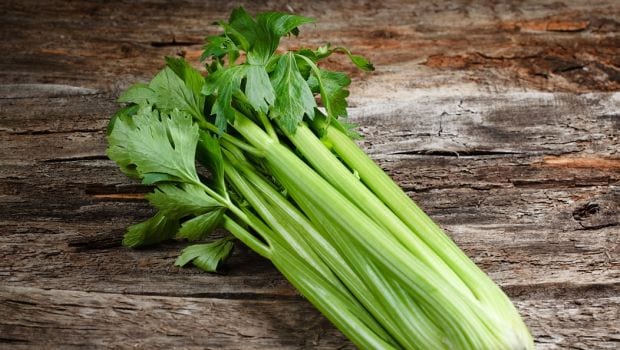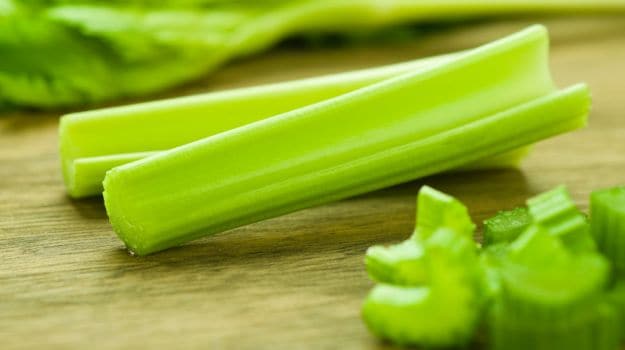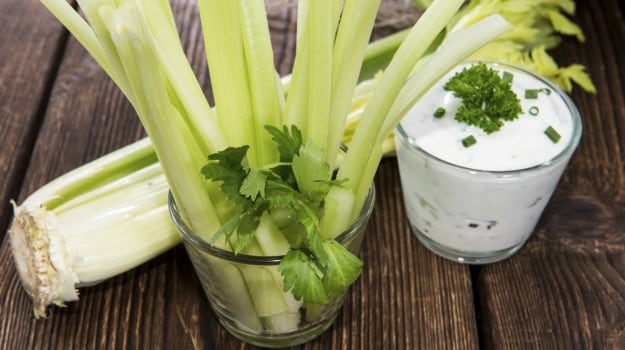7 Incredible Benefits of Celery in Fighting the Risk of Cancer

Celery, scientifically known as Apium graveolens, is a vegetable in the plant family – Apiaceae, which also includes parsley, carrots, fennel, coriander, parsnips, cumin and others. Celery is an excellent source of antioxidants and healthy enzymes. It is also a rich source of vitamin K, vitamin C, potassium, folate and vitamin B6. By including it in your diet, you will not only lower the risk of cancer but also prevent a host of other diseases and health concerns, thanks to the numerous medicinal properties of this leafy veggie.
Celery had been used as an anti-hypertensive agent in ancient medicine since the 9th century and there are several cardiovascular benefits that celery offers. Pharmacological studies have proven that the antioxidant and anti-inflammatory properties of the vegetable help improve blood pressure and cholesterol levels, in addition to preventing many types of heart diseases. Additionally, it is also an important source of fiber that aids in digestion and weight loss when you take it in moderation. The high water and electrolytes content in Celery prevents dehydration and compounds present in celery causes it to act as a diuretic and reduce instances of bloating. Antioxidant flavonoids and polyphenol phytonutrients in celery improves liver, skin, eye and mental health.
Here are few benefits of adding celery to your daily diet:
1. Chemo-Protective Celery
Polyacetylenes compounds present in celery are chemo-protective and prevents a host of cancer formations, specifically breast cancer, lung cancer, intestinal cancer, colon cancer, pancreatic cancer and leukemia. It is powerfully anti-cancerous. It also boosts the immune system, thereby mitigating mutated cells from proliferating and causing tumorous formations.

2. Rich in Flavonoids
Almost all natural foods come packed with numerous health benefits, while others are simply disease fighting wonders. Celery is one of them. It has been found to be very effective in killing ovarian, pancreatic, prostate, breast, liver and lung cancer cells. Celery’s bioactive flavonoids apigenin and luteolin combats free radicals in the body and kill cancer cells by depriving it of the food they need to grow and multiply. Flavonoids are basically plant pigments.
3. Encourages Programmed Cell Death
Apigenin found in celery kills cancer cells by encouraging apoptosis or programmed cell death that causes malignant cells to self-destruct themselves. Antioxidant, anti-tumor and powerful anti-inflammatory compounds present in celery has been traditionally used in Chinese medicine to treat gout and some arthritic diseases as well.

4. Hinders the Replication Cycle of Cancer Cells
On the other hand, Luteolin present in celery hinders the replication cycle of cancer cells. As per the BioMed Central Gastroenterology Journal, Luteolin stops the signal pathways (IGF and PI3K) which encourage the growth of cancer cells, specifically colorectal cancers. Cancer of the colon is very much rampant in developed countries and ranks second among all types of cancer related deaths. Luteolin also impedes excessive production of TNF-alpha – known to be a major source of inflammation.

5. For Lung Cancer
Researchers in China have found that eating just medium stalks of celery 2 to 3 times a week can lower the risk of contracting lung cancer by a whopping 60%. An administration of dose controlled apigenin and antitumor drugs together are very impactful in fighting human lung cancer.
6. For Breast Cancer
Furthermore, celery is also effective in preventing and curing breast cancer, the most common type of cancer amongst women in India. Including sumptuous amount of apigenin in the diet can lower the risk of developing breast cancer by 19%, and ovarian cancer by 20%. It works on even fatal and fast growing breast tumors by stopping cell multiplication and mitigating a gene that causes cancer growth. Moreover, blood vessels that drive cancer cells also shrinks, thereby causing less nutrient to flow in to the tumor, hence starving them and limiting their capacity to proliferate.

7. The Role of Apigein
Apigein also decreases the vascular endothelial that causes protein growth, which in turn fuel the growth of cancerous tumors and prevents glucose uptake thereby preventing cancer cells to generate in the pancreas.
Organic celery is better because it is free from pesticides. Commercially grown ones typically contain high doses of chlorothalonil, which is highly carcinogenic. There are eight known families of cancer-combating compounds that celery possesses, for example vitamin C and vitamin E, phthalides, acetylenics, phenolic acids and coumarins.

Note: One of the most important points to keep in mind is that people who already have cancer will not be cured by eating flavonoid-rich foods alone, but added drugs and treatment should be administered to multiply their impact.
[“source-ndtv”]


